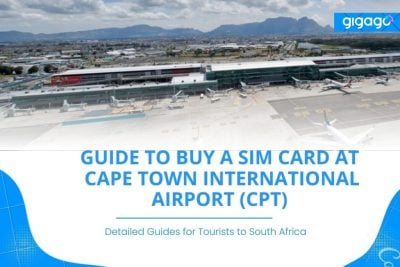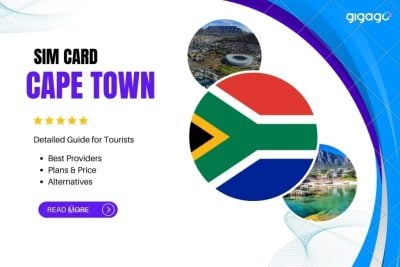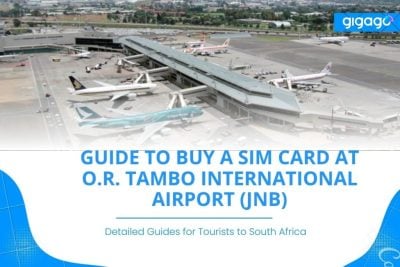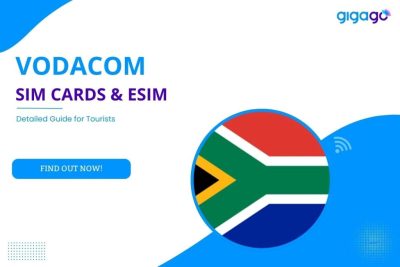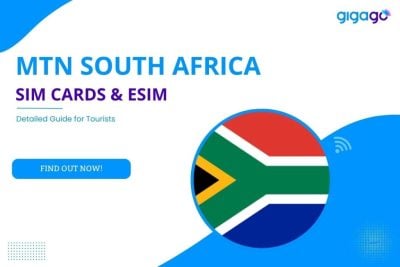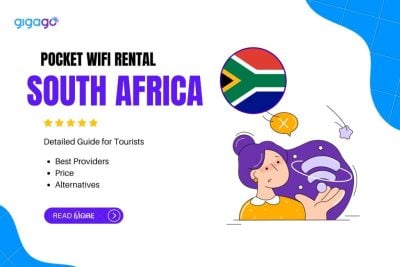Many tourists choose to buy a SIM card at Cape Town International Airport (CPT) instead of buying it at another location or using another method.
How To Use Cell Phone In South Africa: Traveler’s Guide To Stay Connected
You don’t have to ask yourself how to use cell phone in South Africa anymore. If you are planning to go to South Africa, all the tips related to cell phones, including sim cards, questions and answers, and pros and cons can be found in this article. Staying in touch seems hard while traveling; but don’t worry, it’s a piece of cake after reading us.
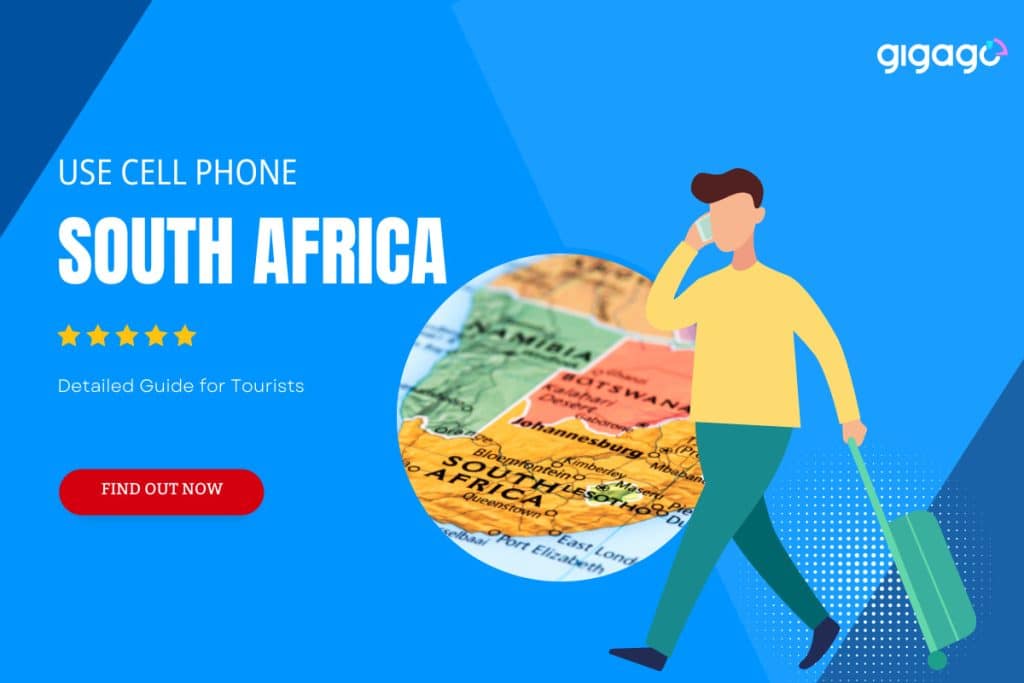
In this article
I. Highlights of Phone Compatibility, Frequencies, and Networks in South Africa
Compatibility, Frequencies, and Networks are the three biggest elements that visitors should pay attention to when traveling to South Africa.
1. Compatibility
Most modern smartphones equipped with GSM, UMTS (3G), and LTE (4G) technologies should work in South Africa.
It’s essential to ensure that your phone is unlocked and supports the frequencies used by South African network operators.
Check with your phone manufacturer or carrier to confirm compatibility and whether your device supports the necessary frequencies for 3G, 4G, and potentially 5G networks in South Africa.
2. Frequencies
GSM (2G), UMTS (3G), and LTE (4G) technologies are popular in South Africa.
The frequencies for 2G and 3G services cover 900 MHz and 2100 MHz.
Bands 3 (1800 MHz), 8 (900 MHz), 20 (800 MHz), and 40 (2300 MHz are popular at South Africa, used for 4G & LTE.
5G networks are in urban areas. n78 (3500 MHz) is the common band.
3. Networks
Vodacom: One of the largest mobile network operators in South Africa, providing both 3G and 4G/LTE services.
MTN: Another major player in the South African market, offering 3G and 4G/LTE services.
Cell C: A smaller operator compared to Vodacom and MTN but still significant, providing 3G and 4G/LTE services.
Telkom: Operates both mobile and fixed-line services, offering 3G and 4G/LTE.
II. Will My Cell Phone Work In South Africa?
Generally, it’s a YES, your cell phone will work in South Africa. However, you need to prepare some things before using it as various factors need to be considered to access the internet and other services. One of the most important factors is SIM cards.
Let’s go deeper into the bands and frequencies of cell phones and sim cards. You can refer to the table below for more information:
| SIM Card Technology | Frequency Bands | Notes |
| 2G (GSM) | 900 MHz | Commonly used for voice and basic data services. |
| 2G (GSM) | 1800 MHz | Additional capacity for GSM services. |
| 3G (UMTS) | 900 MHz | Commonly used for 3G services in rural areas. |
| 3G (UMTS) | 2100 MHz | Commonly used for 3G services in urban areas. |
| 4G (LTE) | Band 3 (1800 MHz) | Widely provided by all major operators for LTE services. |
| 4G (LTE) | Band 8 (900 MHz) | Supplementary band for LTE services, enhancing data coverage. |
| 4G (LTE) | Band 20 (800 MHz) | Used for LTE services, particularly in rural areas for better coverage. |
| 4G (LTE) | Band 40 (2300 MHz) | Offering additional capacity for LTE services, particularly in urban areas. |
| 5G | n78 (3500 MHz) | Initial band for 5G deployment in South Africa. |
For sure, South Africa is not the only interesting place for traveling. You can see an overall picture by reading this article: How to check if your cell phone works abroad when traveling.
III. Do I Need An International Plan In South Africa?
Yes, you need an international plan in South Africa. Your cell phone is provided national plan, which allows you to use your phone nationally. For sure, you can quickly connect with your friends, colleagues, family members,… by using Wifi. However, Wifi is not available to you all times, at all places. That’s why an international plan is needed.
By using the international plan, you will have some benefits as below:
- Making calls and sending messages internationally at appropriate rates
- Mobile data rate is better than regular data roaming rate
- Can keep your phone numbers for easy contact
- Many data packages are offered for calls, messages, internet. You can choose based on your needs
- Quickly get help when needed in case you are in an emergency
IV. What Are Options To Use Cell Phone In South Africa For Tourists?
Tourists visiting South Africa have several cellphone usage options during their stay. Among them, we have three main options, namely eSIM (your phone must be compatible with eSIM), SIM Card, and Pocket Wifi.
1. eSIM Plan for South Africa
Although eSIM is not as common as traditional SIM Cards, eSIM has been growing in South Africa for few years. These days, some mobile network companies provide eSIM plans for both domestic citizens and international travelers.
Generally, eSIM plans for South Africa are good for a diverse range of users, flexible, convenient, and easy to use for both temporary and long-term cellular service needs. Because of the high demand, you can easily purchase eSIM and eSIM plans.
There are many ways to buy eSIM for South Africa, like buying from Local retailers and store, airport kiosks, online, or mobile network companies. However, it is recommended to buy it online for convenience and cost-effectiveness because you do not need to show anything for registration.
Note: You need to make sure that your cell phones are supported with eSIM technology before purchasing eSIM.
Pros:
- High convenience as customers can activate immediately without coming to stores
- High flexibility when switching eSIM plans
- Some cell phone models accept multiple eSIM accounts, meaning you can have many phone numbers
- Environmental-friendly as no physical SIM is needed
Cons:
- Limited compatibility as not all cell phones accept eSIM
- Not as available as SIM card so buyers need to verify carefully before purchasing
- Highly dependent on a particular cell phone so if you lose your cell phone, it’s a problem
- Service of eSIM plans will be stopped if your cell phone gets the problem
2. International SIM card for South Africa
Using an international SIM Card is the traditional way to stay in touch and connected while traveling in South Africa. But, to use international SIM card, your cell phones must be unlocked, meaning that is not locked to any specific network carrier. You can check your phone’s lock status by yourself or contact with your phone’s manufacturer.
To buy international SIM cards for South Africa, here are some options:
- Airport
- Mobile Phone Companies
- Local convenient stores
- Local supermarket
- Online and offline retailers
- Third-party sellers
How about the pros and cons of an international SIM card? Let’s check below information:
Pros:
- High personal information protection
- Easy money control by using a pre-paid SIM card
- Keep your South African phone number forever when returning to this country
- Cost savings, around 350% in average, less than roaming phones or calls from hotels
- Early received South African phone number
- Keep your current phone numbers and apps
Cons:
- RICA process needed
- Hard to find micro and nano SIM cards
- Long queues when buying airtime/data
- Running out of credit at inopportune times
- Might lose your cell phone
3. Pocket WiFi
Pocket Wifi is an easy and smart option for travelers in South Africa. Before purchasing a pocket Wifi, travelers should consider some key factors, such as the coverage, data plans, device compatibility, and price compared to your budget.
Using pocket Wifi is popular for many people when they come to South Africa. Therefore, many places sell this item. You can rental a pocket wifi from online retailers such as Travelwifi, Rentnconnect, Klook, etc.
To help customers quickly find their strengths and weaknesses, let’s go through the pros and cons below:
Pros:
- Convenience to use multiple device connection
- Budget-friendly
- High-speed connection
- Password for a high level of security
Cons:
- The initial cost is a bit higher than other solutions
- Limitations on data coverage & battery
- Limited on device compatibility – some models cannot connect with pocket Wifi
- Additional device to carry
► Our recommendation: You are advised to use eSIM for South Africa travel once your phone supports it. No more waiting for SIM or other device delivery, no more personal information registered. Just do it all online and you will stay connected right the second you land in South Africa. That’s simple!
V. Will My Local Network Work In South Africa?
Well, it’s likely possible. Each country has its own frequency bands and infrastructure, aiming to provide the best mobile services to its citizens. This means when citizens travel, they will be able to use their local networks.
However, the roaming fee is a big concern. The roaming fee is very high when you use local networks in other countries. Moreover, it will be out of control if you cannot control the amount of data when traveling.
Warning: Using local networks in South Africa means roaming cell phones – the most expensive solution. Please consider this carefully.
VI. Gigago eSIM – A Good Way to Use Cell Phone in South Africa to Get Internet
For those with eSIM-supported devices, eSIM is an excellent option to access the internet while traveling South Africa. It is quick and easy to buy, install and use. Additionally, eSIM includes multiple plans for calls, messages, and internet data. Hence, choosing a package that suits your personal needs will become faster and easier.
As a specific recommendation, choose Gigago eSIM is your eSIM provider. Gigago offers multiple eSIM data plan options for South Africa, with prices ranging from $4.50 – $29.00 . Their minimum 15 GB/15 days starts at just $4.50 .
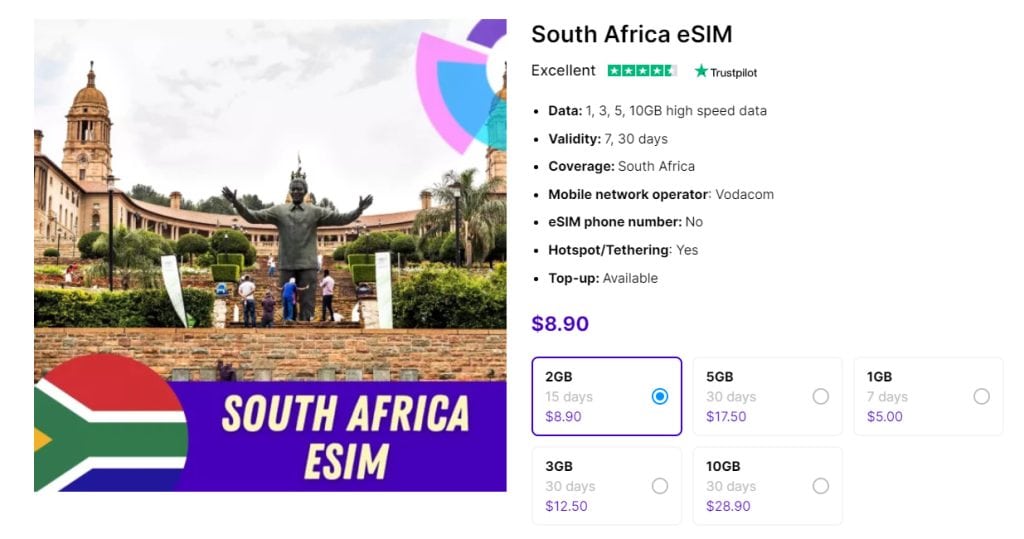
With this range of affordable plans, Gigago can accommodate any type of user and trip length in South Africa. Whether you only need occasional internet access or plan to stream extensively, Gigago has a South Africa eSIM plan to fit your needs and budget. The flexibility of their pricing makes Gigago a great eSIM solution for travel to South Africa.
Depending on the length of your traveling, your habits, and your needs, customers can choose their most suitable data plans.
VII. Extra Tips To Use Cell Phone in South Africa
I believe that some extra tips will help you use cell phones in South Africa effectively. Let’s check:
- Make sure your phone is unlocked
- Make sure the compatibility of your cell phones (bands and frequencies)
- Careful consideration of data plans, eSIM, and other alternative options
- Download offline maps
- Use messaging apps
- Keep emergency services in mind (10111 – police, 10177 – an ambulance, and 112 – general emergency service)
VIII. FAQs about Use Cell Phone in South Africa
What phone service works in South Africa?
They are MTN, Vodacom, Cell C, and 8ta, a subsidiary of Telkom.
What do I need to charge my phone in South Africa?
All you need is a micro USB Type B cord and a 3-pinned Type M power charger.
Do I need an adapter in South Africa?
Yes, you do need it. As South Africa’s plug has a different design compared to other countries, an adapter is a must when you come to South Africa.
IX. Conclusion
Undoubtedly, we have to use cell phones all the time, particularly when we come to other countries. To use cell phone in South Africa effectively, we need to have careful consideration of the purpose of the trip. This article covers all options and solutions, and comparison charts with advantages and disadvantages for different purposes. Wish all of you guys a fun and safe trip to South Africa!
